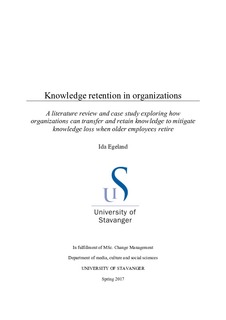| dc.contributor.advisor | Røvik, Kjell Arne | |
| dc.contributor.author | Egeland, Ida | |
| dc.date.accessioned | 2017-10-11T09:15:55Z | |
| dc.date.available | 2017-10-11T09:15:55Z | |
| dc.date.issued | 2017-06-15 | |
| dc.identifier.uri | http://hdl.handle.net/11250/2459574 | |
| dc.description | Master's thesis in Change management | nb_NO |
| dc.description.abstract | Knowledge has become one of the greatest success factors for organizations in today’s competitive and knowledge driven landscape. But what happens when knowledge leaves? As cohorts of baby-boomers, the generation born in the post-war period are facing retirement, the field of knowledge retention is emerging. The question to be asked is clear: What can an organization do to retain knowledge in the organization, if and when facing these possibly troubled times?
This study has aimed to illuminate the phenomenon of knowledge retention and knowledge transfer between generations. By conducting a structured literature review and a qualitative case study of Statoil, the study has sought to shed light on this theme from different angles. Statoil is a highly knowledge-intensive company, and the industry they with a workforce, as well as the industry as a whole, is approaching a significant generational shift. That made it a relevant and interesting case to draw experiences from.
The main findings indicate that awareness is an important starting point for all retention and transfer activities. Strategies and practices that enhance continuous knowledge transfer and retention is found to be a key for mitigating knowledge loss in the long run, as are a repertoire of flexible knowledge transfer methods. The study finds that mutual exchange of knowledge should be applied as a model in knowledge transfer initiatives. Findings point to how translation competence can play a significant role in the knowledge transfer process. In addition, it has come to light that leadership with deliberate direction and encouragement for knowledge retention seems to be of much importance for how knowledge retention and knowledge transfer between generations can happen.
An understanding of how knowledge retention can happen may be vital for organizations that wants to stay competitive. This research has been a contribution in illuminating this topic additionally, and can thus be used for learning in organizations with similar challenges. | nb_NO |
| dc.language.iso | eng | nb_NO |
| dc.publisher | University of Stavanger, Norway | nb_NO |
| dc.relation.ispartofseries | Masteroppgave/UIS-SV-IMKS/2017; | |
| dc.subject | knowledge transfer | nb_NO |
| dc.subject | translation theory | nb_NO |
| dc.subject | generations | nb_NO |
| dc.subject | knowledge retention | nb_NO |
| dc.subject | change management | nb_NO |
| dc.subject | knowledge management | nb_NO |
| dc.subject | endringsledelse | nb_NO |
| dc.subject | kunnskap | nb_NO |
| dc.title | Knowledge retention in organizations. A literature review and case study exploring how organizations can transfer and retain knowledge to mitigate knowledge loss when older employees retire | nb_NO |
| dc.type | Master thesis | nb_NO |
| dc.subject.nsi | VDP::Social science: 200::Economics: 210 | nb_NO |
